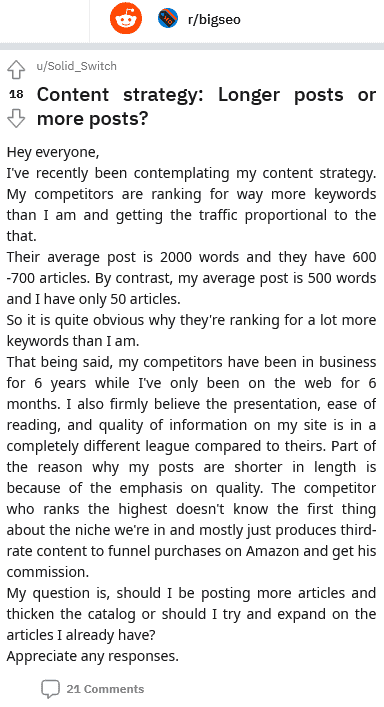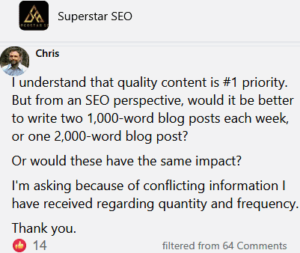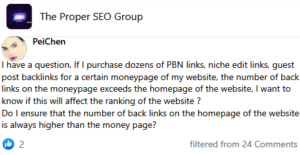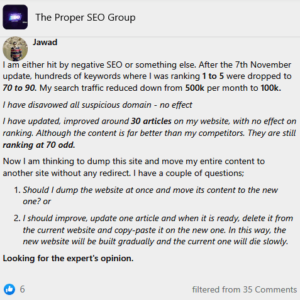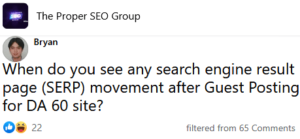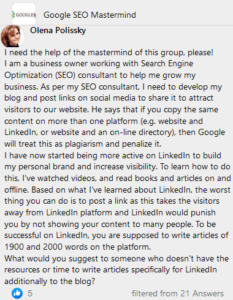u/SolidSwitch
Content strategy: Longer posts or more posts?
Hey everyone,
I've recently been contemplating my content strategy. My competitors are ranking for way more keywords than I am and getting the traffic proportional to the that.
Their average post is 2000 words and they have 600 -700 articles. By contrast, my average post is 500 words and I have only 50 articles.
So it is quite obvious why they're ranking for a lot more keywords than I am.
That being said, my competitors have been in business for 6 years while I've only been on the web for 6 months. I also firmly believe the presentation, ease of reading, and quality of information on my site is in a completely different league compared to theirs. Part of the reason why my posts are shorter in length is because of the emphasis on quality. The competitor who ranks the highest doesn't know the first thing about the niche we're in and mostly just produces third-rate content to funnel purchases on Amazon and get his commission.
My question is, should I be posting more articles and thicken the catalog or should I try and expand on the articles I already have?
Appreciate any responses.
21 💬🗨
📰👈
My personal opinion from what I can gather from what you said is this.
Keep writing articles that are of higher quality. The quantity plays little to no role. Most times my ideology is "less equals more".
Length of an article depends the niche. The question you should ask is
"Am I answering the users questions? Do I provide what they are looking for? Does my article provide the same or better value than my competitors provide even if it's less in words?"
People and engines appreciate that. Babbling on just to keep them there doesn't cut it.
Also keep in mind your 6 months versus their 6 years. You need to work hard to build that initial authority. After a while it will pick up and you will be unstoppable.
Keep it up
I second this.
It's not about quantity or length, it's a matter of answering the question people have. So figure out what the best possible answer to the question is, and write that.
Absolutely this. Articles should be 'as long as they need to be, and as short as they can be'.
There is some research on this which shows that there is a fall-off in quality when posts are around 1,000 words long. Basically, if you can't say it in under 700 words, it needs more depth – a couple thousand words to get into things properly. It's like in highschool where you'd have to write a 1,000 word essay and would just waffle a bit to pad it out. Under 800 or over 1200 seems to be a good rule of thumb.
Reis
I know this is old. Sorry. I'm reading the top of the month posts.
If answering the question properly is the goal. isn't MORE posts a good part of the goal?
If you can answer 1 question a week vs answering 3. While not losing the needed quality to stay relevant… isn't this just better? Scalating things.
Obviously. As I mentioned above write quality articles. What that means is different for everyone and every niche.
If you have the ability to write 3 or even 10 articles a week without sacrificing quality then go ahead and do so. Obviously big content marketing companies have people writing extremely good articles every day without sacrificing any of the quality.
If you are one person though that becomes hard.
The whole idea is thought, to personally be honest and say I can only write 1, 2 or 3 good articles per week/month and I won't try to fluff one in order to have more.
theeastcoastwest
I think the mindset of longer content == better rankings is outdated. For sure, it was a valid approach ~2-3 years ago.
I still think one has to often create more content than a reader might want in order to satisfy Google. I also think that gap is closing and will continue to do so. Unfortunately for publishers, many queries that can be satisfied by really short answers are now done so via Search Engine Result Page (SERP) features like Instant Answers (no page view for you!)
My answer is this; yes you should be posting more articles to thicken your catalog and yes you should also be expanding the articles you already have\-if it makes sense. In other words, if you can address a keyword in <300 words I'd add that additional content to the most relevant article. If it's not related to anything enough to fit as an expansion, find 3-4 other topics that similarly can't be fit into existing content and write a new piece.
In such cases that the 300-word answers to topics don't fit anywhere: create an Frequently Asked Question (FAQ) page.
TL;DR: Don't add a lot of fluffer content to hit specific word counts but also make sure you're not creating pages without much content. IMO Google still needs a little hand-holding though, so maybe add a little bit of fluffer. It truly is an artistic balance in many regards IMO.
This is the truth – watch everyone avoid it!
edgarallanbro
Google is looking for thicc content that answers people's questions. It's all about user intent. While you can increase your chances of ranking for more long tail searches by creating a higher volume of content tailored to those keywords, your chances of ranking well for top keywords are much better with thoughtful, informative, long form content. Multimedia pages seem to help as well.
seoconspiracy
Velocity means rhythm and speed for a content strategy. You should have a mix of in-depth pieces of content surrounded by smaller ones. Preparation is the key, meaning content is prepared one year in advance (for the evergreen stuff) because it's deployed in multimedia (text, video, image, audio) and follows the usual workflow : production, distribution, promotion, analytics, rinse & repeat. Rehashing enables to create dozens or hundreds pieces of content around the topic. Study what I do if you want to get a taste of the process (I just started a couple of months ago, but you will find me easily everywhere)
tankdamagesupport
Analyze Search Engine Result Page (SERP). See what kinds of articles rank, besides your competitor. Maybe you'll find other factors at play besides content length. Could be server speed or over optimization. Maybe backlinks. My point is a 1v1 comparison is not the whole story. See what Google ranks that is similar to your site, find the correlated factors and decide. Good luck.
hardi
Quality + Quantity + Consistency = Traffic + Brand Building
You can't avoid any factor (quality, quantity or consistency) while trying to drive traffic to your website or building a sound brand.
As u/tolkinas mentioned aptly, answer your customers' or prospects' questions.
Don't talk about 'features'; talk about the 'benefits' your business is offering. Do it consistently.
If you're consistent enough in adding value to your customers, you can easily outperform your competitors (even if they've been doing it for the last 6 years now).
Also, focus on promoting and distributing your content. If you do it well, you can make 300 content pieces out of your 50 articles.
